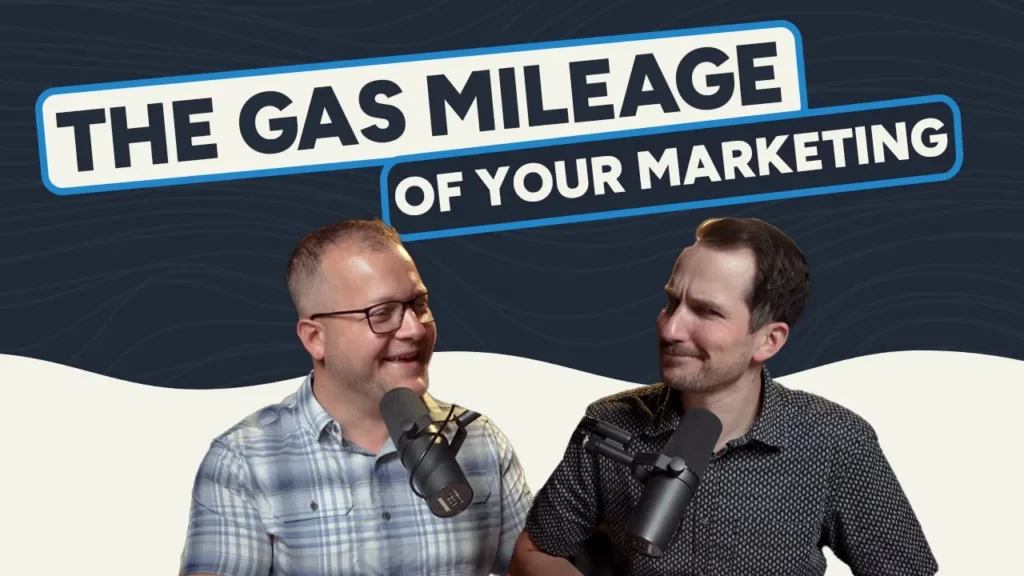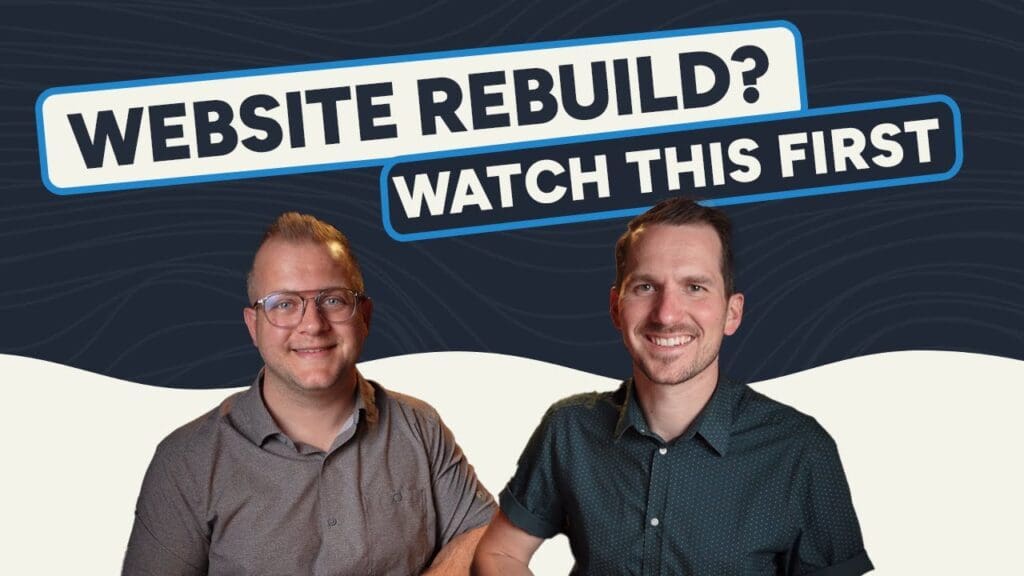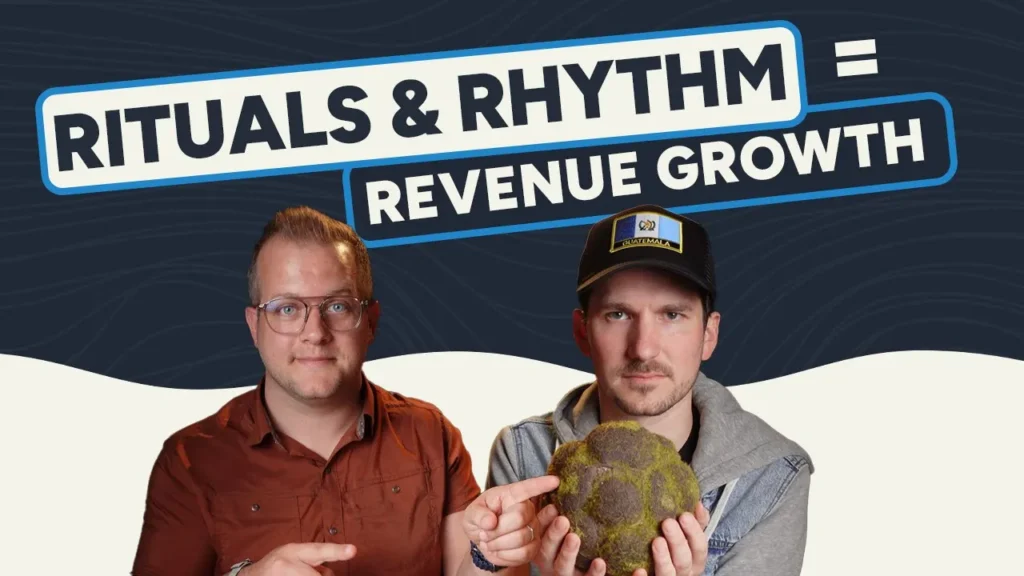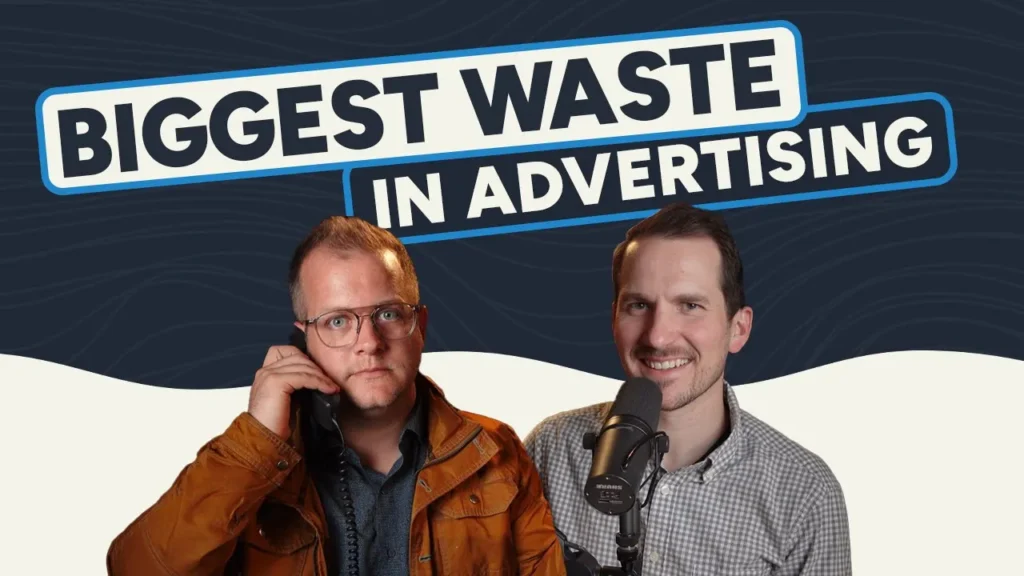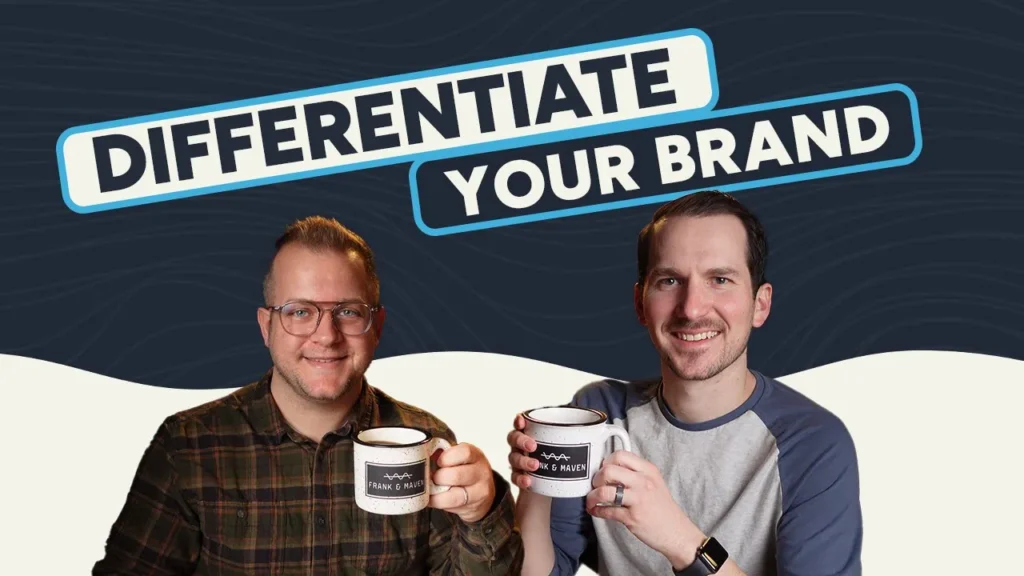How To Get The Best Deal on TV & Radio Advertising (Part 2)

00:00 Intro
00:35 Buying Media with the Right Mindset
04:01 The Benefits of Committing to a Station
08:06 What are Posting Standards and why are they Important?
12:17 Recap
12:36 Managing your Ad Spend after it’s been Placed
13:10 Keep An Eye out for Special Spots
14:33 Know When to Change Your Ad
16:08 Auditing your Station
17:51 Recap
19:50 Should You Take Advantage of Rotation Packages?
24:22 When to Take Advantage of Digital Added Value
27:01 Final Rundown
This Episode Hosted by:
Recent Episodes:
What Are CPMs? The Gas Mileage of Your Marketing
Rituals & Rhythm = Revenue Growth
Get New Episodes In Your Inbox:
We'll be back every Monday answering your real life marketing questions!
Listen to Audio Only:
Keep Sharpening Your Marketing Skills With The Maven Marketing Podcast
What Are CPMs? The Gas Mileage of Your Marketing
CPMs are the great equalizer of marketing media. To make great decisions, you need to know how…
Rituals & Rhythm = Revenue Growth
Culture eats strategy for breakfast—and in this episode, Brandon Welch and Caleb Agee show you why rhythm…
The Single Biggest Waste In Advertising
You might think the biggest waste in advertising is bad creative, weak targeting, or outdated platforms. But…
IDKWNTHTB – Keep Showing Up!
Every business owner hits the wall. You launch the campaign, tweak the copy, show up every week—and…
Stop asking, “How did you hear about us?” (do this instead)
It’s lurking… tucked into a form on your website or maybe it’s a part of your sales…
IDK Who Needs To Hear This But: You Need To Fill One Glass At A Time
FREE MARKETING AUDIT: MavenMarketingAudit.com Get a copy of our Best-Selling Book, The Maven Marketer Here: https://a.co/d/1clpm8a Our…
How to Immediately Differentiate Your Brand
There are no more unique value propositions. You could invent the next big thing and you’ll have…
Brandon Welch 0:00
And so when you’re the one that’s confident, a that breeds all sorts of confidence and good things will show up for you. People appreciate people who are consistent, and they can trust absolutely in both your media exposure, like, literally, the audience and the deals you get with the station. And like, a couple years after you doing this, you are going to be royalty at the station.
Megan Ellis 0:24
Welcome back to the Maven Marketing podcast. This is part two of how to get the best deal on TV and radio advertising. If you haven’t yet check out last week’s episode. To get the first two tips. Can I talk about tip number three? Can we move on number three? Number three. Number three is and we kind of touched on this on number one, but you do want to buy an annual schedule. Don’t buy Don’t, don’t go into this thinking about it monthly or thinking about it quarterly. I think that that is oftentimes how you know, anytime I’ve ever seen an advertiser or a business owner get super bummed out about anything advertising relating related, it’s because they went into it with the wrong mindset.
Brandon Welch 1:07
Yeah, they think, Oh, well, I’ll just try this, and here, in a couple few months, if it’s not working, I’ll switch gears. Yeah, absolutely. I’ll just it’s and the assumption is either this station isn’t the right station, right or this advertisement more call together exactly, and we tell people true story. And any of our clients could comment on this and tell you, we have people like, Yeah, let’s jump into TV, radio. And we’re like, Okay, do you have six months of the money that you’re going to spend bare minimum, six months? I prefer 12, but I want it in a bank account or in an imaginary area that is set aside. And if you looked at your resources right now and you go, I don’t have to have that to operate my business in the next six to 12 months. Therefore, I’m not going to be emotional about it, because it’s not competing with my ability to go on vacation, or my ability to pay my people, or my ability to repair an AC unit, if it goes out exactly, think annually, at a bare minimum, because this has very, very little to do with the actual advertising and way more to do with your category and how human beings actually behave. Let me repeat that. It has way more to do with how human beings actually behave. It doesn’t matter how good or cheap your roof or your HVAC unit or your solar system is, there is just a natural seed time and harvest of human behavior that I’m not going to buy that until I feel like buying it. And that’s everybody. And so if you’re the one expecting that, you threw a few ads at me this month and now I’m going to suddenly buy you’re terribly mistaken that human beings are robots, and they’re not robots. They’re human beings. They have their own needs, absolutely so you want to be able to get past that build up period and a lot of advertising people will say to their demise, well, you just have to wait. It takes time, but they can’t explain why. Well, this is why, because buying cycles the average roof takes 16 or 17 years before somebody actually buys it. Absolutely average automobile takes four to five years with some before somebody actually buys it. The average attorney takes eight to 12 years before somebody actually buys it. And so that’s a force that can’t be reckoned with. So you have to be there for a while, and you have to build that stamina. That’s why you’re thinking annually and buying annually. Yeah.
Megan Ellis 3:21
And you also, if like the way I like to think about it is like an investment account, you know, I’m investing in my 401K every single month. And it’s not helping me right now, but someday it’s gonna be there for me. And so you think about it that way,
Brandon Welch 3:35
I know a handful of people who pulled all of their money out of their IRA, threw it to, you know, Bitcoin. And because they were going, Oh, well, how to wait for that return. I can get this big one now. And it was just ask them where they are now, yikes. So,
Megan Ellis 3:50
yeah, that was tip number three, buy annually. Just it will it will help your business. It will help you. But this also bleeds into Tip number four, which is get added value. So if you buy annually, you have the right to ask for some added value. Added value added value added value. Added value is, hey, Mr. Station group, I’m committing to you. Why isn’t it a Mrs. Could be I prefer Mrs. Mrs. Station group. I’m committing all of this money to you. This is my plan to do this. If I do this, what might you have in store for me? Yes, and so you’re not greedy. If you ask those questions, this is just a part of the negotiating process, because they have all sorts of things at their stations that they are trying to promote sponsorships. You know what’s it called? Weather
Brandon Welch 4:53
camp. Weather camps. Thank you. Weather apps. They have
Megan Ellis 4:56
apps. There’s tickers that go along the bottom in a bigger
Brandon Welch 4:59
city. Who could sponsor their helicopter. I would love to do that any type of like local sports, anything, or closed captioning or kid programs or and what they’re doing is saying, yeah, for the advertiser who commits this amount of money, you know, for 12 months, and we don’t have to go back and forth, we’re not constantly worrying if we’re going to make our budget. Because, guys, let’s face it, most advertisers are fidgety. They’re impulsive, and they’re trying to jump in and jump out and oh my gosh, my you know, you know, most important employee just asked for a raise. I got to take that out of advertising. And it’s not a strategic thought. It’s an impulsive, emotional thought. And so when you’re the one that’s confident, a that breeds all sorts of confidence and good things will show up for you. People appreciate people who are consistent, and they can trust absolutely in both your media exposure, like, literally, the audience and the deals you get with the station. And, like, a couple years after you doing this, you are going to be royalty at the station even your first year when you commit to it. Yeah. And so guess who’s going to get the best deal when it comes to freebie stuff? Absolutely, you Yep, versus the guy who might be spending quote, unquote the same amount of money, but he’s on and off, on and off, and you can’t count on him, and the reps got to spend four or five extra hours a month tracking him, this guy down for his pay, and he’s always 90 days later
Megan Ellis 6:19
commitment and his yeah, oh, man, yeah, no, that’s why it’s better to go about it this way. So
Brandon Welch 6:25
be a premium be a premium advertiser. By committing annually, you will get added value and just ask them. Say, cool, well, I’m confident in your station. I like you. I like your people. I am comparing you to another station right now, and one of my deciding factors is, how much extra Are you going to give me, knowing that I’m gonna be one of the easiest people you’re gonna work with.
Megan Ellis 6:44
And not to mention, I mean, a lot of this stuff, it sounds like, you know, Brandon always says, Megan beats up all of our, you know, media reps. And I’m like, no, no, no, I don’t, because truly, it’s just, it’s just a courtship process in the beginning, but once I’m yours, I’m yours, and just treat me right, and we are solid. It’s just a happy little relationship moving forward, where you just, you know, it’s very, very simple. And so
Brandon Welch 7:09
the truth is, in a medium sized market, unless you are spending north of probably 750, to a million a year, there’s always more audience to get with that one station you mentioned earlier, you passed you passed by. This did i But? But people aren’t. People are not just a one program type person, like most people, watch three to four hours of television a day, and so there’s always a different audience like you might start with buying a news program. Well, there’s five or six other news programs you can maximize that audience with and so it doesn’t mean we never buy multiple partners. When the budget affords us to buy we buy multiple partners, but typically, we’ll pick a partner and we’ll max out their opportunities, so long as they meet the commodity standards we’re trying to buy before we go trying to, you know, whizzy wag it up with a bunch of different stations like that.
Megan Ellis 8:04
it up. There you go. Okay, I’ve got one more tip as we go into the political year, is, please, please, please, know the posting standards. Know the station that you’re about to partner with, understand what their posting standards are. What in the world is the posting standard? Oh, man. So everyone thinks, oh, I committed to this station. And gee, I, you know, bought some I buy some TV ads every month, and I hope they run. I know I pay a bill every month. I don’t know if they actually ran or not. Guys, this can be audited, this can be managed, this can be tracked, and this should be and so whenever we buy any type of media, we look at it, we look at the ratings. We say, Hey, Mrs. Station group, you like that? We say, Mrs. Station group, you said it was going to deliver a five rating. And then at the end of that quarter, three months later, when we go back and we look and see, hey, how many people actually were watching that program for the last three months? Which
Brandon Welch 8:58
quick stop off? We do that. There are third party measuring systems. The one you’re probably most familiar with is called Nielsen. The Nielsen ratings, those come out, used to be once a quarter. Now, technically, in most markets, you can pull them at any given time, because they’ve gone digital. But you’re saying, hey, this quarter, what we bought, we agreed to 500 rating points. Yes, we paid XYZ for them. Did the programs we buy actually equal 500 rating points? Right? And they said, well, nope, it actually audiences a little light, and it equaled 300 rating points. Well,
Megan Ellis 9:31
then we go back to them and say, Ah, that’s well, that we were missing 200 rating points. So we really need you to give that to us in free spots. We need you to make that good for us. Call the make good. And that would be 100% posting industry standard is 90% so industry standard says that they really only have to deliver 90% of what they initially promised. That standard. Yeah, that’s 180
Brandon Welch 10:01
makeup rating points. And they do that by saying, Well, yeah, took me a second, but so yeah, you you agreed to 500 they delivered 300 in post analysis. You’re looking at this and you’re going, cool. What are you gonna give me? 480 rating points? Well, they may have a really awesome program. Let’s just say it gets 18, an 18 rating that’d be a nice, really nice size program, right? That means almost 20% of the people are watching. But 18 rating points, well, we’ll give you 10 spots in that. That equals 180 rating points, and everybody’s good. All is right in the world,
Megan Ellis 10:32
and a lot of people don’t know that. That’s a thing. You don’t know what you don’t know. And posting is a thing, and so I love it when our partners agree to post for us part one, they just agree to post for us part two. If we can get them to agree to 100% we really want them to, you know, put their money where their mouth is. And so oftentimes, we might go with a station that says, yeah, we’ll post to 100 because we know we have the audience stations. You’ve
Brandon Welch 11:00
been warned. Just you got a glimpse. Into Megan’s Megan’s standard. She’s frugal,
Megan Ellis 11:07
yeah. And my favorite, favorite reps are the ones that don’t make me ask to post. I know that this is, this is a thing, but I have this one rep who I just adore her. And she just, every single three months, she says, Hey, Megan, we over delivered great news. Or every once in a while, she’ll say, sad news, we under delivered. Here’s a schedule that we’d like to make it good in. And it’s just so cool. And so if you’re any type of shout
Brandon Welch 11:32
outs or give her a shout out, Michelle, I knew it was Michelle’s the best.
Megan Ellis 11:39
You’re the best.
Brandon Welch 11:41
So I got there. So break it down to an average, like business owner who doesn’t have time to worry about all this nerd stuff. What you’re going to say, Hey, dude, and they, my experience is nine out of 10 of them will not do it unless you ask, right again? And that’s fine. That’s fair. You know, if you don’t get a lot going on, yeah, I’m not. I’m not trying to beat up any of our friends, but you say put a reminder on your calendar. Hey, did my ads run? Did they reach the audience they were supposed to? And if you’ve got a good station, often, they do, and that’s good. That’s good news for you. If they didn’t, they give you free spots. Everybody’s happy, yep. Okay, safe to say, we’ve covered, negotiating up front. We talked about planning, buying early, sorry, committing early, buying on numbers instead of just relationships, buying annually, asking for added value, and knowing the posting standards. What about managing the ad spend after it’s been placed? I’ve probably
Megan Ellis 12:41
been all over the place on this. But, um, while your schedule is running, there’s a few things you can do to make sure you continue to get the very best deal. It’s the quarterly post analysis, like we just talked about, yeah, um, ask your station to compare the the points they promised to how big the audiences actually ended up being. So that’s a huge one. And, you know, make sure that you just do your due diligence there and do that. And then part two is, you know, ask your rep for the best deal possible. They might even have, you know, extra spots at discounted rates. They might have games or specials or unsold inventory, that you’re the person that they go to for that I call
Brandon Welch 13:23
this hells of a deal. There you go. We tell the rep, hey, we just committed this money to you. I may or may not, wink wink, have a little extra in my client’s budget, or I may or may not, wink wink, be willing to go and say, if this is just an outrageous opportunity, I’ll go ask for a little extra money, right? If it’s a good deal, right? And so like, if
Megan Ellis 13:42
the chiefs, chiefs are in the Super Bowl this year, chiefs, and, you know, all of a sudden we’ve got, you know, we’re in Springfield here. We’re in Missouri. So we really like chiefs. Sometimes people will pony up for that, and they’ll be like, You know what, I just have to be in that game. My,
Brandon Welch 13:55
my more favorite examples are when they’re like, there’s, like, the Academy Awards and some big advertiser backed out, oh yeah, and they’re like, Oh man, we’ve got three spots that were spoken for, and now they’re out. We’ll give them to you at half price. That’s happened to me, right? And if you got a good relationship with that rep and say, Dude, I’m your annual guy, I’m your premium guy, you and I both know I’m royalty. Call me when something cool happens, and it’s good for them too, because it allows them to solve a problem. Right, and build that relationship. But I would encourage you to shell out another 10% of your budget when those things come up.
Megan Ellis 14:29
Yeah, that’s a good point specials, let’s see. So you want to another way to manage is you want to make sure that you’re changing your traffic, and that means your your actual TV or radio ad often enough to avoid fatigue. Yes, I don’t think we’ve even touched on this yet. Every single time an ad reaches a five to six times seen by an audience that starts to lose its impact.
Brandon Welch 14:53
Yeah, that doesn’t mean literally played five or six times. It means that oh yeah, there’s, yeah, there’s, well, no, that’s.
And they’ll have this package that’s forwarded to them. This rep will be like, Hey, we’ve got the best deal of the year. And, you know, it looks like you’re gonna get $20,000 within advertising for, you know, $9,000 and the guy’s going, Man, I don’t want to pass this up. Is this really a good deal? Um, tell me about those types of opportunities. And do you recommend them?
Megan Ellis 20:23
I tend to not recommend them. Okay,
Brandon Welch 20:27
why in the world would I not want to get $11,000 of free advertising? Well,
Megan Ellis 20:32
I mean, yes, get the free advertising all you want. But here’s the thing, a lot of those rotator packages, all of those things, those that’s inventory that other people aren’t buying. And so your ads are going to fall in the places that are not they don’t have that high demand. And so you might be paying a premium price for a subpar program.
Brandon Welch 20:56
That’s possible. I’ve seen that to where they just over inflate the value. And really, there’s people paying, you know, the same rate you are. What about consistency? You just, yeah, you call that a rotator. Tell me what that means. Tell everybody a rotator
Megan Ellis 21:10
is a run of schedule.
Brandon Welch 21:15
Yeah. So they’re promising a number of ads in a large window, right? Exactly. It looks like, Oh, we’re gonna give you 20 ads in the next month between the hours of midnight and 5am
Megan Ellis 21:24
and the only way we would ever consider that is if we had a core schedule laid out that we never stray from. Yeah.
Brandon Welch 21:31
So that 80% that that minimum three times a week in TV, minimum 40 times a week in radio. Thank you. By the way, don’t buy two radio stations if you’re not doing 40 spots per week in the first one, right? You’re better off to add another 20, 3040, spots to the same station and max out your frequency. There probably 80 spots a week on a regular schedule, is probably the tip top of that. And then you can add another station. But let’s talk about rotators on TV. They’re going, we got a bunch of inventory, there. They want the flexibility to spend your money when it serves them best. And I mean no disrespect to any stations doing this, it’s used often to get people into the mode of advertising, and it’s usually very short term thing. You know, I hear it called a first quarter package or first quarter special a lot of times, because that’s a time where there’s a lot of extra inventory, if you can’t get a guarantee on the programs and the audiences that you’re going to be in. And that frequency we talked about earlier is kind of a minimum frequency that three times per program per week every week. Don’t do it, even though the numbers might look really, really appealing. Yes,
Megan Ellis 22:39
it’s, oh my gosh. This reminds me of Dave Ramsey. This is a Dave Ramsey moment. This is whenever he would say, you’re like, man, but this living room furniture is on such a it’s got such a great sale. It’s such a great sale. So I need money. I need to buy it now, and it’s like, but you, you shouldn’t buy it now, because it’s not if you can’t even afford it, you know, yeah, or
Brandon Welch 23:02
if it’s not, if it’s not adding true value. And media works the best when you do it consistently and long term with the same people as we’ve talked about. And so as an add on, if you, if you had a really great, maybe not freebie, but if you’ve got a really solid schedule and you had a really great Fourth quarter, and they go, Hey, you want this. You’re going because at that point, the general audience is primed enough that the average household probably knows who you are. If you’ve been doing this, 2345, years, don’t do this in your first year. Sorry. Sorry, media folks that are selling this rather take that same money and, you know, put it in a consistent schedule. But if you’ve, if you’ve got general household awareness, you can afford to do some extra random buys, because you’re adding to that frequency, and people already know who you are, yep. Otherwise you have that consistent so what about so that was kind of these packages, what we call run of schedule. If you ever see the word Ros, or if you’re seeing somebody you know, put this on a bullet point, 12 spots between these hours. 12 spots between these hours, eight spots between these hours. Oh, and you’ll get a special in America’s Got Talent, we’ll guarantee you one, or we’ll guarantee you a football game. They’re giving you, they’re giving you unconsistent inventory, and it serves them better than it does you. So last thing, what about digital or added value? They go, well, you’re spending this well, we want you to spend $2,000 a month on our digital products too. What do you what say you come
Megan Ellis 24:37
to Brandon, what do you think about this?
Brandon Welch 24:40
Um, it goes, go, go back to the principle with tomorrow marketing, our goal is to reach the same people as often as we can daily, right, right? Absolutely, so same people over and over and over again. And so sometimes there’s a really cool digital. Product that we know for sure, like, dude, 80% of the people watching our TV programs have got to be using. This would be things like news and weather apps. And if I’ve got a really, really solid creative and a really, really promotional thing that I know is worthy of a direct response, I’m thinking like sweepstakes, or I’m thinking like sweepstakes, a big offer, a seasonal like, you know, buy one, get one, or something like that. I will let them give me a little bit of that added value, but not, not typically, near the amount that they hope that I will let them do that. Yeah, um, behind the scenes, I can tell you the station groups and the big, big owners of stations want to show their shareholders diversified revenue. They want to show we’ve got this much in our core broadcast, and we’re growing this digital segment, and so everybody’s selling digital. And I’m not demonizing digital for heaven’s sake. I’ve made a living at it, and yeah, so my very best friends do this, but I would say, back out and buy digital for a specific reason, not just because it got thrown in. I would prefer you to use that inventory, that extra inventory, on your core advertising schedule, and then say, okay, more in the today category, more in like the lead generation, if you’re talking about the Maven method, which, by the way, as of today, is available in hardback on Amazon. Oh my gosh, that’s so cool. Hard cover, congratulations.
We’re gonna give away some of those. That digital piece is usually more associated with a targeted reach the quote, unquote, perfect person today, and give them an offer. And so as a broad stroke, I would save that digital investment for a today agenda. And you can read all about that in the Maven marketer, how to set up your marketing budget, and how to have a budget and a plan for today, tomorrow and yesterday. Customers love that. That is our secret sauce. That’s how we grow companies by multiple hundreds of percents, and, you know, just a couple few years. So do you think we’ve covered the topic?
Megan Ellis 27:03
I think we’ve I think we went through that. I’m
Brandon Welch 27:08
glad we broke this up into two parts. So yeah, if you happen to get to the end of this one and didn’t listen to last week’s episode part one of how to get the best deal on advertising in 2024 go back and do that. But I’m going to give you a quick rundown of the mega Mego, the mego mega mom tips. We’re splitting this into two categories, how to negotiate up front, and what you’re doing there is you’re planning early. You are buying on numbers, not just relationships. You are buying annually, saying, I’m going to commit this to you annually. You are asking for added value, because you are a premium advertiser as giving them a long term commitment. You should be rewarded for that. And then you are knowing your posting standards. And once you are running this advertising, you are one doing a quarterly post analysis, just ensuring you’re getting the rating points and audience you absolutely agree to. You’re asking your rep for a heck of a deal when specials come up and you’re making sure you’re changing your traffic often enough to avoid ad fatigue and keep your audience constantly mesmerized, don’t
Megan Ellis 28:09
forget that you’re also auditing this every single month, maybe even by the week, to make sure what you bought is what you got. And
Brandon Welch 28:16
side note, if you ain’t got time for that, hire media buyer, there you go. Megan is the best that I know. You can ask for Megan’s opinion on your media buying. Yes, you can at MavenMonday@frankandmaven.com you can also ask questions there for your business and your business growth. We are doing a ton of annual planning. These episodes we have coming up are going to be so fun. We’re going to do an episode on everything you should avoid in media buying in 2020 buying in 2024, and beyond, but until then, we’ll be back here every week answering your real life marketing questions, because marketers who can’t teach you why are just a fancy lie. Thanks so much for watching. Have a great week.

